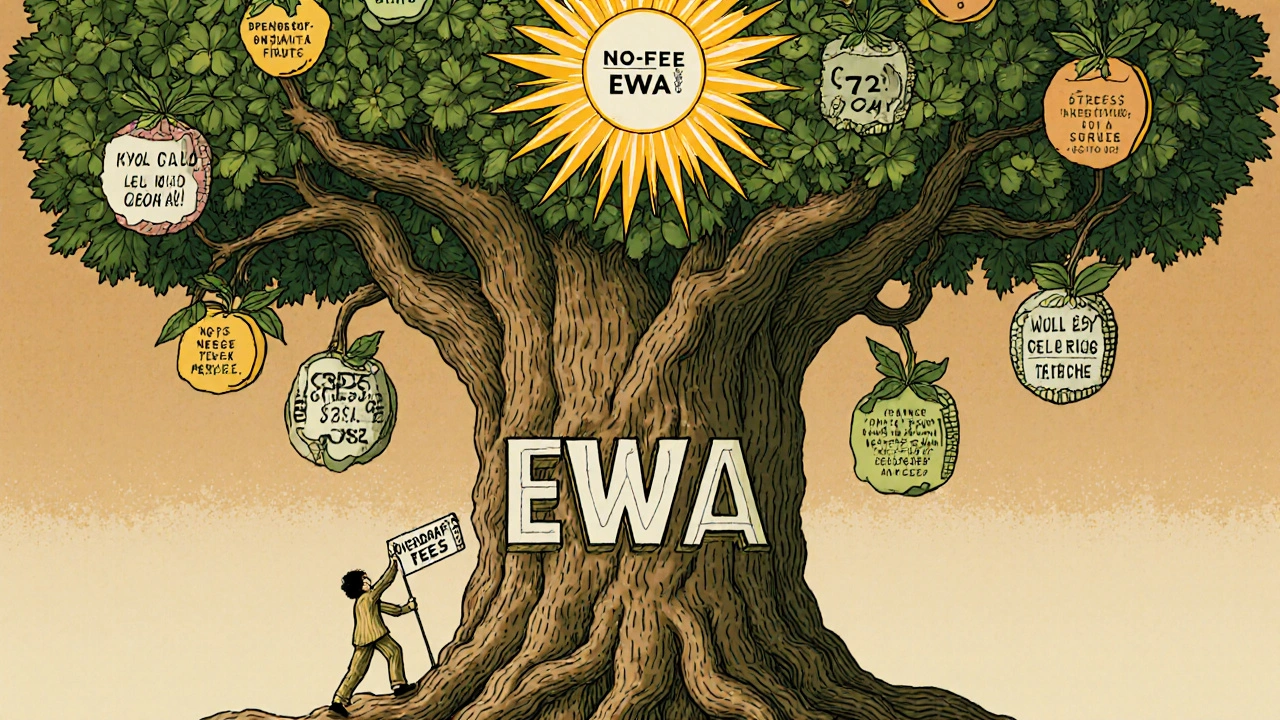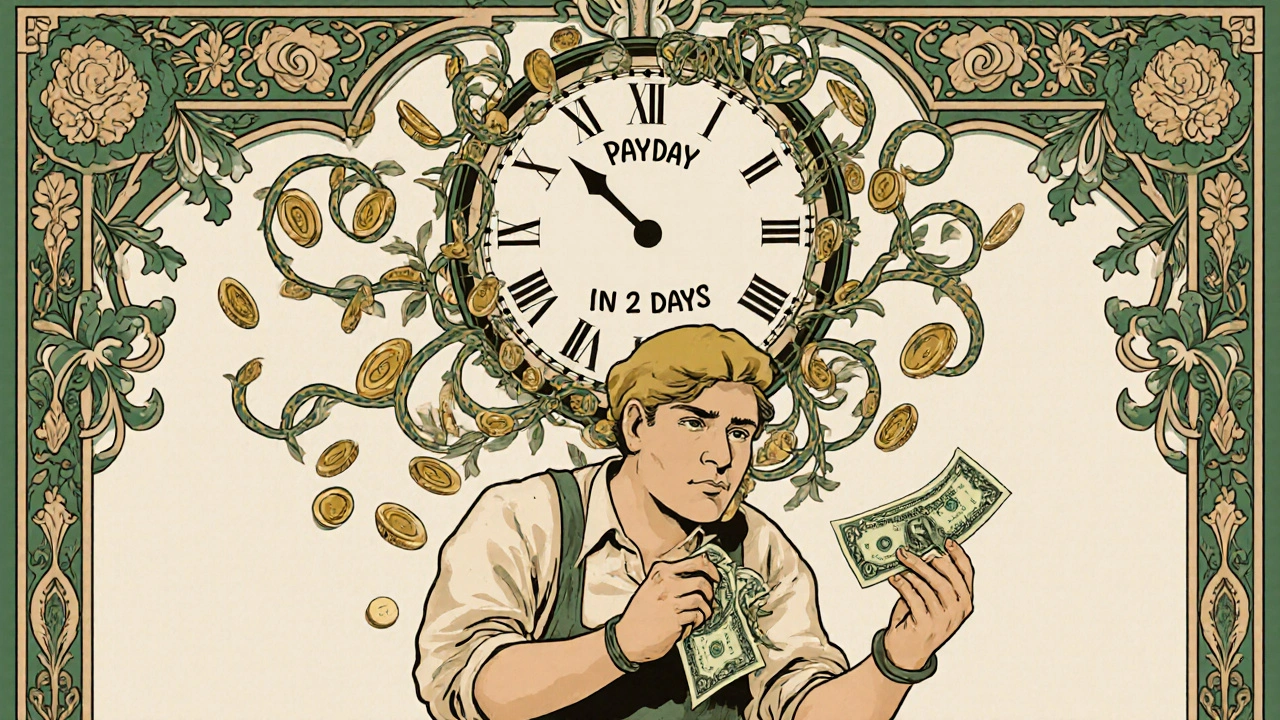EWA Fee Calculator
Calculate how much you're paying in earned wage access fees based on your usage patterns. Many workers don't realize how much they're paying until it adds up over a year.
Every month, millions of workers in the U.S. turn to earned wage access (EWA) services to get their hard-earned money before payday. It sounds simple: you’ve already worked the hours, so why wait two more days to get paid? But behind the convenience is a hidden cost that many users don’t see until it’s too late. What’s marketed as a free or low-cost lifeline can turn into an expensive habit - especially if you’re using it every week.
How EWA Fees Add Up Faster Than You Think
Most EWA providers don’t charge a flat monthly fee. Instead, they charge per transaction. On the surface, $2.99 to get your paycheck early seems harmless. But if you’re accessing your wages twice a month, that’s $6 a month. Do that for a year? You’ve paid $72 just to get your own money sooner. Multiply that by 15 million users, and you’re looking at nearly half a billion dollars in fees collected annually. The Consumer Financial Protection Bureau (CFPB) found that the average worker pays $68.88 per year in EWA fees. That number more than doubled between 2021 and 2022, even though the percentage of workers using the service barely changed. Why? Because people are using it more often. Nearly half of all users access their wages more than once a month. For someone living paycheck to paycheck, that’s not a luxury - it’s survival. But survival shouldn’t cost you 109.5% APR, which is what the CFPB calculated for a typical EWA transaction. That’s higher than most payday loans. And it’s not a typo.Free Isn’t Always Free - Here’s How Providers Trick You
You’ve probably seen ads that say “Get paid early - no fees!” That’s technically true. But only if you’re okay with waiting 24 hours. Instant access? That’s where the fees kick in. The CFPB found that 96.6% of all EWA revenue comes from expedited transfers. Providers make it clear: basic access is free. Instant? That’s $1.25 to $4.95 per hit. Take DailyPay: $1.25 for next-day, $2.99 for instant. PayActiv: $3-$5 per pay period, no matter how many times you access. FlexWage: $2-$5 per access, capped at $15 a month. FinFit: $4.95 per withdrawal. Dave: $1 monthly subscription, but $3 extra if you want cash out to your bank. Even if you’re only using it once a month, those fees stack up. And here’s the kicker: most employers don’t pay for it. Only about 5% of EWA fees are covered by employers, according to the CFPB. That means you’re footing the bill - even if your company promotes the service as a “benefit.”Real Stories: What Users Actually Pay
Reddit user u/WageWorker2024 shared their experience: “I used DailyPay twice a month. Didn’t realize how much those $3 fees added up until I saw my bank statement - nearly $75 last month just for early access.” That’s not an outlier. PeopleKeep’s 2024 survey found that many employees are shocked when they see the total fees on their EWA statements. They thought it was a one-time perk, not a recurring charge. On the other hand, some users feel it’s worth it. Glassdoor reviews of PayActiv show 78% of users consider the $3-$5 fee reasonable - especially if they’ve avoided an overdraft fee that would’ve cost $35. Trustpilot users on Dave say the $1 monthly fee is worth it for occasional emergencies. But those are the exceptions. The real problem is when people use EWA out of necessity, not choice.
Who’s Doing It Right? The No-Fee Movement
Not all EWA services charge users. Chime Workplace claims workers keep every dollar they earn - no fees, no hidden costs. How? They don’t charge you. They charge the merchant. By integrating directly with payroll systems and using interchange fees from debit card transactions, Chime covers the cost of early access without touching the worker’s paycheck. Since Q4 2023, they’ve processed over $2 billion in no-fee wage advances. Walmart’s Even platform also operates without direct fees to employees. Other emerging providers are following suit, leveraging merchant networks, bank partnerships, and payroll integrations to eliminate user fees. These models are sustainable because they don’t rely on workers’ financial stress to make money. The CFPB is pushing for change. In May 2024, they proposed a rule that would require EWA services to be completely free for employees. If passed, it could wipe out the entire fee-based model overnight.What You Should Do Before Signing Up
If your employer offers EWA, don’t assume it’s free. Ask these questions:- Is there a fee for instant access? How much?
- Is there a fee for standard (24-hour) access?
- Is there a monthly cap? How many free accesses do I get per pay period?
- Does my employer pay any part of the fee?
- What happens if I use it more than once a week?

The Bigger Picture: EWA Isn’t the Problem - Low Wages Are
Earned wage access grew because people couldn’t wait for payday. But it didn’t fix the root issue: most workers earn too little to cover basic expenses between pay cycles. The average American lives paycheck to paycheck. EWA lets them survive - but at a cost. The best EWA services don’t charge fees. They work with employers to make sure workers get paid fairly and on time. Until wages rise, EWA will remain a necessary evil. But you don’t have to pay for it. Look for providers like Chime, Even, or any service that says “zero fees for employees.” If your employer offers one, ask them to switch. If they don’t, push for it. You’re not asking for a handout. You’re asking for your money - without a markup.What’s Next for EWA?
The industry is at a crossroads. Legacy providers like DailyPay and PayActiv rely on fees. New entrants like Chime and Walmart’s Even are building models that don’t. Regulatory pressure is mounting. California launched an investigation into EWA fees in March 2024. The CFPB is preparing to enforce rules that could force providers to reimburse overdraft fees they cause. By 2026, analysts predict the market will consolidate around transparent, low-cost models. High-fee EWA services won’t disappear overnight - but they’ll lose market share fast. Workers are waking up. And they’re choosing providers that treat them like customers, not cash cows. Don’t be the one paying $70 a year just to get your own paycheck early. Know the cost. Ask questions. Choose wisely. Your wallet will thank you.Are earned wage access fees legal?
Yes, EWA fees are currently legal in most states, but they’re under increasing regulatory scrutiny. The CFPB has proposed rules that would require EWA services to be free for employees, and states like California are investigating whether these fees violate consumer protection laws. Some providers are already shifting to no-fee models ahead of potential regulation.
Is earned wage access better than a payday loan?
Yes, but only if you use it sparingly. Payday loans often carry APRs over 300%. EWA fees, when averaged out, can reach 109.5% APR - still high, but significantly lower. However, frequent use of EWA can make it just as expensive as a payday loan over time. The key difference is that EWA gives you access to money you’ve already earned, not borrowed.
Can my employer pay my EWA fees for me?
Yes, but it’s rare. Only about 5% of EWA fee revenue comes from employer contributions, according to the CFPB. Some companies, especially larger ones or those with strong benefits packages, do cover fees as a perk. If your employer offers EWA, ask if they subsidize any part of the cost - and if not, consider asking them to.
Which EWA provider has the lowest fees?
The lowest-fee providers are the ones that charge nothing. Chime Workplace, Walmart’s Even, and some newer fintechs offer zero-fee earned wage access by funding services through merchant interchange fees or payroll integrations. Among fee-based providers, DailyPay’s $1.25 next-day transfer is among the lowest, but only if you don’t need instant access.
Do EWA fees affect my credit score?
No, EWA services typically don’t report to credit bureaus, so using them won’t help or hurt your credit score. However, if you rely on EWA to cover expenses and end up overdrawing your bank account, those overdrafts can lead to collections or negative bank records - which can indirectly impact your financial standing.
What’s the best way to avoid EWA fees?
Use a no-fee provider like Chime Workplace or Even. If your employer offers one, sign up. If not, ask them to consider switching. Alternatively, build a small emergency fund - even $100 saved over a few months can cover unexpected expenses without needing early access. Avoid using EWA more than once a month unless absolutely necessary.

Dave McPherson
Oh, so we're now pretending this is a moral crisis instead of a market failure? People use EWA because rent's due Thursday and their paycheck lands Monday. The real villain isn't the $2.99 fee-it's the fact that capitalism expects you to survive on a 1970s salary in 2024 with a 2023 cost of living. Chime’s no-fee model? Cute. They’re not doing it out of altruism-they’re sucking interchange fees from every coffee you buy. The system’s rigged. We’re just arguing over which bandage is prettier.
And don’t get me started on ‘employer-paid’ EWA. That’s like your landlord offering to pay your water bill… if you sign a 5-year lease and agree to never complain about the mold.
Also, 109.5% APR? That’s not a fee-it’s a tax on desperation. And we wonder why people don’t trust banks.
Wake me when the CFPB starts regulating CEO bonuses instead of worker survival tools.